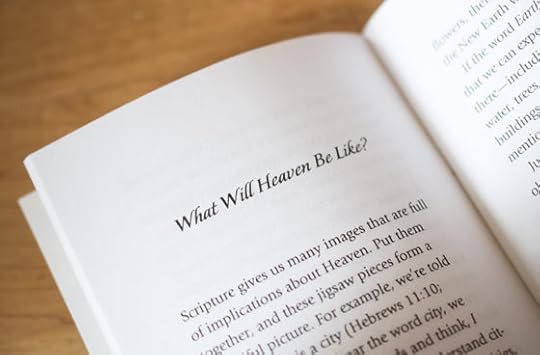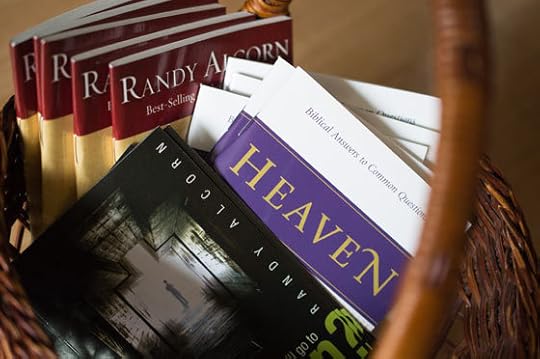Randy Alcorn's Blog, page 168
March 9, 2015
Charles Simeon's Example of Starting by Finding Common Ground
Charles Simeon (1758–1836) reinvigorated the English church with his emphasis on the primacy of Scripture and the necessity of practical application.
Simeon was a Calvinist but disliked the label. In a sermon on Romans 9:16, he said,
Many there are who cannot see these truths [the doctrines of God’s sovereignty], who yet are in a state truly pleasing to God; yea many, at whose feet the best of us may be glad to be found in heaven. It is a great evil, when these doctrines are made a ground of separation one from another, and when the advocates of different systems anathematize each other.… Mutual kindness and concession are far better than vehement argumentation and uncharitable discussion.
Simeon practiced what he preached. We get a glimpse of this through a conversation he had with John Wesley, reported by Simeon himself.
 “Sir,” Simeon said to Wesley, “I understand that you are called an Arminian; and I have been sometimes called a Calvinist; and therefore I suppose we are to draw daggers. But before I consent to begin the combat, with your permission I will ask you a few questions.… Pray, Sir, do you feel yourself a depraved creature, so depraved that you would never have thought of turning unto God, if God had not first put it into your heart?”
“Sir,” Simeon said to Wesley, “I understand that you are called an Arminian; and I have been sometimes called a Calvinist; and therefore I suppose we are to draw daggers. But before I consent to begin the combat, with your permission I will ask you a few questions.… Pray, Sir, do you feel yourself a depraved creature, so depraved that you would never have thought of turning unto God, if God had not first put it into your heart?”
“Yes,” answered Wesley, “I do indeed.”
“And do you utterly despair of recommending yourself to God by anything that you can do,” Simeon continued, “and look for salvation solely through the blood and righteousness of Christ?”
“Yes, solely through Christ,” Wesley replied.
“But, Sir, supposing you were at first saved by Christ, are you not somehow or other to save yourself afterwards by your own works?”
“No; I must be saved by Christ from first to last.”
“Allowing, then, that you were first turned by the grace of God, are you not in some way or other to keep yourself by your own power?”
“No.”
“What then, are you to be upheld every hour and every moment by God, as much as an infant in its mother’s arms?”
“Yes; altogether.”
“And is all your hope in the grace and mercy of God to preserve you unto his heavenly kingdom?”
“Yes; I have no hope, but in him.”
“Then, Sir, with your leave, I will put up my dagger again; for this is all my Calvinism; this is my election, my justification by faith, my final perseverance: it is, in substance, all that I hold, and as I hold it: and therefore, if you please, instead of searching out terms and phrases to be a ground of contention between us, we will cordially unite in those things wherein we agree.”
Of course, the Wesley and Simeon story doesn’t mean Calvinism and Arminianism are the same. They aren’t. Some Arminians would give different answers than Wesley did, and some Calvinists would ask different questions than Simeon. But I admire the spirit of anyone who starts by looking for common ground; sometimes you’ll find a great deal more than you expect.
Learn more about Randy's book hand in Hand: The Beauty of God's Sovereignty and Meaningful Human Choice.
March 6, 2015
The Crowded Kindnesses of God
 God isn’t just in life’s monumental things. He’s present in the little things: rain drops, the artistry of spider webs, and the sound of an acoustic guitar. A child’s laugh, surfing songs, a swing set, sprinklers, and the smell of split cedar. Colorful birds and fish. Stars that declare God’s glory. Little League, skiing, ping pong, hot showers, a slam dunk, Disneyland. Maple syrup, fresh green beans, buttermilk biscuits, and homemade strawberry jam. Aspirin, artificial limbs, wheel chairs, and synthetic insulin (I can’t live without it). Ripe oranges straight off the tree. Pecan pie a la mode, chocolate chip cookies hot out of the oven and a tall glass of cold milk (in my case, this would require a lot more insulin). A good recliner, the smell of leather upholstery, and a dog’s wagging tail.
God isn’t just in life’s monumental things. He’s present in the little things: rain drops, the artistry of spider webs, and the sound of an acoustic guitar. A child’s laugh, surfing songs, a swing set, sprinklers, and the smell of split cedar. Colorful birds and fish. Stars that declare God’s glory. Little League, skiing, ping pong, hot showers, a slam dunk, Disneyland. Maple syrup, fresh green beans, buttermilk biscuits, and homemade strawberry jam. Aspirin, artificial limbs, wheel chairs, and synthetic insulin (I can’t live without it). Ripe oranges straight off the tree. Pecan pie a la mode, chocolate chip cookies hot out of the oven and a tall glass of cold milk (in my case, this would require a lot more insulin). A good recliner, the smell of leather upholstery, and a dog’s wagging tail.
If we disregard these and thousands of other gifts, we don’t just fail to notice them, we fail to notice God. God’s goodness is always evident if we look in the right place. “[H]e is actually not far from each one of us, for in him we live and move and have our being” (Acts 17:27-28).
Alexander Maclaren advised, “Seek to cultivate a buoyant, joyous sense of the crowded kindnesses of God in your daily life.”
One of my Bible college professors often used illustrations of Christ’s presence in the small events of his day. I asked myself why those things didn’t happen to me. God showed me they did—I just hadn’t noticed!
If we fail to see God’s “crowded kindnesses,” it’s not because they’re lacking but because we’re blind.
In a letter to his wife Elisabeth, Jim Elliot observed, “Amy Carmichael writes of little joys, like flowers springing up by the path unnoticed except by those who are looking for them. . . . Little things, like a quietly sinking sun, a friendly dog, a ready smile. We sang a little song in kindergarten which I’ve never forgotten: ‘The world is so full of a number of things / I’m sure we should all be as happy as kings.’ Simple, but such a devastating rebuke to the complaining heart. I am impressed with the joy that is ours in Christ, so that heaven above and earth below become brighter and fairer.”
This article originally appeared in the spring 2015 issue of Eternal Perspectives.
March 4, 2015
Why the Reality of the Resurrection Means You Don’t Need a “Bucket List”

The term “bucket list” was popularized by the 2007 movie of that name. It’s an inventory of things people want to do before they “kick the bucket.” The idea is, since our time on earth is limited, if something is important for us to do, we have to do it now, because this is our only chance to do it.
This makes sense from a naturalistic worldview, one which doesn’t recognize any afterlife. It also makes sense from various religious worldviews that maintain there may be existence after death, but without resurrection and physical properties, and with no continuity between this life and the next. The one worldview in which the bucket list makes no sense is biblical Christianity.
Don’t misunderstand. My wife Nanci and I enjoy life—going new places and doing new things. I don’t believe this is wrong, nor is it wrong to list things you’d like to do if God gives you the resources and strength. But the “bucket list” mentality, that this life is our only chance to ever enjoy adventure and fun, is profoundly unbiblical. It disregards the teaching of the resurrection:
But your dead will live; their bodies will rise. You who dwell in the dust, wake up and shout for joy. . . . The earth will give birth to her dead. (Isaiah 26:19)
Many of those whose bodies lie dead and buried will rise up, some to everlasting life and some to shame and everlasting disgrace. (Daniel 12:2 NLT)
We will be changed. For the perishable must clothe itself with the imperishable, and the mortal with immortality. (1 Corinthians 15:52-53)
The Lord Jesus Christ . . . will transform our lowly bodies so that they will be like his glorious body. (Philippians 3:20-21)
Despite the centrality of the resurrection in Scripture and church history, many Christians have never been clearly taught its meaning, so they imagine they will live forever in a disembodied state. A sincere believer once told me, “I hate to admit this, but I don’t look forward to Heaven. I wish I could live with Jesus on this earth. I want all sin and suffering and death to be gone, but I still want to enjoy the beauty of God’s earth.”
This man loved Jesus, but did not want leave this world and become a ghost or an angel.
As much as he loved Jesus, the Heaven he’d heard about seemed terribly boring and tedious. He’d heard that he should live now in light of eternity, but he thought eternity would mean the end of his opportunity to enjoy music and literature and adventure and travel and learning and discovery. So God would understand, he hoped, if he spent his time and money on his bucket list. After all, now was his only chance to experience happiness.
Ironically, what he wished for is exactly what the Bible promises! We will live with Jesus in these bodies made new, and on this earth made new, without sin and suffering. Once he knew the true biblical story, the unfolding drama of redemption culminating in the resurrection of our bodies and our universe, he could at last realize there was no need for the bucket list.
For the Christian, death is not the end of adventure, but our exit from a world where dreams and adventures shrink, and entrance into a world where dreams and adventures forever expand.
That’s why Nanci and I like to talk about our post-bucket lists, consisting of all the things we look forward to doing after we die, and in particular, after the resurrection. We’re told there will be not only a New Earth, but a New Heavens (Revelation 21:1), the celestial heavens made new, presumably with new galaxies and stars and planets scattered across the New Universe. Remembering the Andromeda Galaxy I first marveled at through my telescope before coming to faith in Christ, I would love to journey there, to the New Andromeda Galaxy, to the praise and glory of King Jesus.
Nanci’s post-bucket list includes her dream to spend a lot of time by a lake, playing with dogs. Joni Eareckson Tada, once freed from her wheelchair, says she wants to run through flowered meadows on the New Earth. Since we’re told we will have physical resurrection bodies and we’ll be living on a physical earth, why not?
The Bible doesn’t specifically tell us about dogs on the New Earth, but it tells us about other animals (Isaiah 65:17, 25) so why shouldn’t we expect dogs? It tells us we will eat and drink (requiring food and liquid), and walk and talk, so why not run through meadows? Or are you expecting an earth without grass and flowers?
Perhaps an alarm is going off—“but that’s unspiritual—we should only want to be with Jesus.” Well, Jesus is right at the top of both of our post-bucket lists! Would the same God who says we should eat and drink to His glory (1 Corinthians 10:31) be offended if we want to play with His animals for His glory and travel to the stars for His glory?
Of course, some of what’s on our post-bucket list may not be exactly as we envision it, but we know this for sure: God has revealed that we will be real people with real bodies living on a real earth with other real people and the real King of Kings—so anything there will be far more than we imagine, not less.
I think God is honored when we let the imaginations He gave us soar as we move our eyes beyond this present fallen world, to anticipate the risen one—holy and happy beyond all comprehension—that the Carpenter from Nazareth has gone ahead to build for us (John 14:1-2).
This article originally appeared in the spring 2015 issue of Eternal Perspectives.
March 2, 2015
Encouragement to Not Give up on Those in Cults (and a Free Evangelistic Pack Offer)

I’m writing this blog ten minutes after two nicely dressed Jehovah’s Witnesses came to my front door, a young man and a young woman, both in their twenties. I asked them who they were with, though I knew before asking, and the young woman said, “Jehovah’s Witnesses.” Many years ago it was hard to get a straight answer from them, but that has changed.
 As I always do, I gave them my Heaven booklet, several copies of which I keep at my front door for such visitors, as well as sales people, delivery people and anyone else I don’t know who drops by. As they walked away down the street I prayed for them, and saw the young woman open it and flip some pages. My hope is that they would see the parts about the New Earth, something Jehovah’s Witnesses talk about far more than evangelical Christians do. Of course, I don’t agree with everything they believe about the New Earth, and nothing they say about the basis of their salvation, but the subject of the New Earth is an entry point and a way of getting their attention.
As I always do, I gave them my Heaven booklet, several copies of which I keep at my front door for such visitors, as well as sales people, delivery people and anyone else I don’t know who drops by. As they walked away down the street I prayed for them, and saw the young woman open it and flip some pages. My hope is that they would see the parts about the New Earth, something Jehovah’s Witnesses talk about far more than evangelical Christians do. Of course, I don’t agree with everything they believe about the New Earth, and nothing they say about the basis of their salvation, but the subject of the New Earth is an entry point and a way of getting their attention.
 I’m going to offer readers EPM’s evangelistic pack (containing five each of the Heaven booklets, Heaven tracts, and If God Is Good booklets) for free if you’ll keep copies by your door to share with people who come by, or with anyone else—neighbors, co-workers, family, friends, whoever. To receive this special offer (a $20.48 retail value), we only ask that you cover the shipping costs. Use the discount code freepack during checkout (one free pack per customer, offer expires March 15, 2015).
I’m going to offer readers EPM’s evangelistic pack (containing five each of the Heaven booklets, Heaven tracts, and If God Is Good booklets) for free if you’ll keep copies by your door to share with people who come by, or with anyone else—neighbors, co-workers, family, friends, whoever. To receive this special offer (a $20.48 retail value), we only ask that you cover the shipping costs. Use the discount code freepack during checkout (one free pack per customer, offer expires March 15, 2015).
I hope the following story will encourage you not to give up on people who are Jehovah’s Witnesses, Mormons or anyone who is part of a pseudo-Christian or non-Christian cult or group.
Thirty years ago, when I was a young pastor, a friend and member of our church told me of a woman named Barbara who was not only a Jehovah’s Witness, but who also trained other Jehovah’s Witnesses on what to say and how to persuade people when they go door to door. My friend said to me, “Randy, you’ve got to meet this woman. We’ve been talking, and she’s got all her Jehovah’s Witness ideas. Would you be willing to meet with her?”
Here was my response, which I’m not proud of: “I really don’t want to meet her and here’s why: I’ve met with numbers of Jehovah’s Witnesses and numbers of Mormons, and nothing ever comes out of it. We sit down, and I open the Bible. I start talking to them, and they’re always all over the place, interjecting all the unbiblical stuff they’ve been taught and not listening. I really don’t want to do it.” (Cleary, I had a bad attitude about meeting with this woman!)
Finally he said, “Come on, I’m a young Christian and I just don’t know what to say to her. Please meet with her.”
So I begrudgingly agreed, “Okay.”
I went into this meeting with a lousy attitude. I suppose I prayed that God would speak through me, and help me connect with her in a loving way, but I certainly didn’t believe that He actually would answer that prayer!
I sat down with Barbara and said, “Could we start by agreeing together that we’re going to trust whatever the Bible says? You can turn to any passage you want; I’ll turn to any passage I want, and we’ll go from there. We’ll trust the Bible.”
She looked at me and said, “Okay, that’s fine, because I do believe the Bible.”
I thought, Yeah, yeah, yeah. You say that, but what’s going to happen as soon as I open it up?
We agreed that I would talk first and she wouldn’t interrupt, then she could talk and I wouldn’t interrupt and then we could talk it through from there.
I turned first to John 1:1, thinking I know how she is going to respond, because this is a key passage that Jehovah’s Witnesses are trained to reinterpret in a way that denies its clear meaning. So I read it: “In the beginning was the Word, and the Word was with God, and the Word was God.” I quickly traced the flow of the text down to John 1:14 and read, “The Word became flesh and made his dwelling among us. We have seen his glory, the glory of the one and only Son, who came from the Father, full of grace and truth.” I showed how the context makes it absolutely clear that the Word who was God in verse 1 was the Jesus who came into the world in verse 14.
Knowing she’d been taught that the verse really meant Jesus was A god not THE God, I said, “From studying Greek in college and discussing this with Greek professors, and the Greek commentators I’ve read, here’s what they say about this passage…. ” What they were saying is that the verse should be translated as virtually every translation does except the Jehovah’s Witness Bible (New World Translation): “the Word was God,” not “a god.”
Then I turned to John 8:58 (“Before Abraham was, I am”) and set up the whole context. I looked at the Titus 2:13-14 which says, “We wait for the blessed hope—the appearing of the glory of our great God and Savior, Jesus Christ.” I told her that the word God and the word Savior, in the original, clearly both refer to Jesus. I took her to at least a half dozen other passages that teach the deity of Christ.
Then I said, “Barbara, what does it seem to you like the Bible is saying about Christ?”
She said, slowly and deliberately, with a sort of stunned look on her face, “It sounds like it’s saying that He’s really God.”
I’m thinking, Okay, she’s just going with me for the moment. Then it’s going to collapse at the end when she comes back with all her Jehovah’s Witness stuff.
We went through Scripture for about half an hour, and then I looked at her and asked, “So, bottom line, what do you think based on this? Not what you’ve been taught as a Jehovah’s Witness, but what do you really think God is saying about Jesus in the Word?”
She responded, “Well, I think it’s saying that I’ve been wrong, and that Jesus is God.”
I shared the Gospel with her, and she prayed and gave her life to Christ. She was disowned by her Jehovah’s Witness family and was baptized in a Christian church, and last I knew she was walking with Jesus.
The moral of the story: don’t give up on people who are in cults. Yes, there is a time when you realize it isn’t productive to keep talking with a person who seems never to listen to Scripture. Maybe you’ve tried and tried to witness to your Mormon or Jehovah’s Witness friend. And you think, I’ll pray for them, but it’s going to take a miracle of grace to break through. But it’s always a miracle for someone to come to faith in Christ. And God does those miracles, sometimes when we least expect him to.
God taught me a very valuable lesson that day. There’s no question in my mind that it was not my wit, wisdom, or good attitude (which had started out bad) that won this woman to faith. It was the power of God’s Holy Spirit at work in her life.
February 27, 2015
Why Are There Different Bibles?

Do you know the differences between the Jewish Bible, the Roman Catholic Bible, the Eastern Orthodox Bible and the Protestant Bible? In this video, EPM staffer Julia Stager explains what those differences are, touches on why they're there, and emphasizes what the important things are in the parts we all agree on:
If you’d like to watch the rest of Julia’s videos, you can subscribe to her YouTube channel: Crossover.
February 25, 2015
Why Your Purchase from EPM Is Making a Difference

This February has been customer appreciation month at Eternal Perspective Ministries, and I want to personally thank those of you who have partnered with us by purchasing from our online store, as well as those who have prayed for us, and been involved with our ministry through social media. We are deeply grateful to God for our supporters.
 EPM first started selling my books back in 1990, when my wife Nanci and I were operating our ministry out of our basement. Nanci would pack the books for shipment and deliver them to the post office. Things have changed a lot since then! Now we have considerably more titles, as well as a warehouse space near our office and a great shipping clerk, Dwight, who handles all of our inventory, packaging and shipping.
EPM first started selling my books back in 1990, when my wife Nanci and I were operating our ministry out of our basement. Nanci would pack the books for shipment and deliver them to the post office. Things have changed a lot since then! Now we have considerably more titles, as well as a warehouse space near our office and a great shipping clerk, Dwight, who handles all of our inventory, packaging and shipping.
It’s fun to think about each book going out, and Lord willing, being used in people’s lives to draw them closer to Christ or help them see their need for Him. I’m so grateful for how the Lord has blessed us as a ministry through many of you—and how we in turn are able to bless others in the name of Jesus Christ.
The profits from the books EPM sells are used to fund our ministry expenses. Here are just a few of the things EPM was able to do in the past year through your support:
EPM gave away 27,397 books in 2014 to organizations such as Operation Mobilization and individuals for ministry needs.
In 2014, we received more than 4,500 contacts from inmates and gave them 8,300 of my books. These books have the potential to touch thousands more lives, as most inmates share the books with other prisoners, as well as family members.
Because the profits from our store go directly to supporting the work of our ministry, we’re freed up to continue giving away 100% of the royalties from my books.* In 2014, $308,622 was given ministries around the world to feed the poor and reach the lost and support all kinds of great ministries. What a privilege to give God's money back to Him!
I thank my God in all my remembrance of you, always in every prayer of mine for you all making my prayer with joy, because of your partnership in the gospel from the first day until now. (Philippians 1:3-5)

From EPM
Thank you! As a special thanks to those who purchase from us, we're offering an additional 20% off the already-discounted prices in our entire store when you use the code appreciation. Offer ends February 28, 2015.
*90% to other worthy Christian organizations and 10% to EPM (to help offset the costs related to the writing/researching/editing of the books, as well as to help facilitate the giving away of our books to people all over the world).
February 23, 2015
The 21 Martyred Coptic Christians: “A Badge of Honor to Christianity”

When I spoke recently at Watermark Church in Dallas, after one of the services a man from a Muslim country came up and introduced himself and his teenage son. He told me, “Six months ago I was a Muslim. Now I am a follower of Jesus. I was baptized just a few weeks ago at this church. My son is going to be baptized soon.” His son smiled.
The man said, “My desire is to go back to my country and bring the gospel of Christ. I am studying the Bible every day. Please recommend one of your books that will help me go deep into God’s Word.” I gave him a copy of my book Heaven, partly because it is possible that if he returns to his country and brings the gospel to people, he will be arrested and even killed. I wrote him a note and gave his son another book and encouraged him to follow Jesus always.
I was just looking again at biblical passages on persecution and martyrdom that I compiled years ago. You might want to consider taking a few of these passages each day and meditating on them—they will change your perspective on life in this world as a Jesus-follower.
Each day, men, women, and children are killed for following Christ. Most often they’re largely ignored by the world but watched by the eyes of Heaven— “the world is not worthy of them” (Hebrews 11:38).
Occasionally we do have the privilege of knowing the names and seeing the faces of our precious brothers and sisters in Christ who pay the ultimate price for their faith, such as the 21 Christian men who were recently martyred by ISIS.
Perhaps you’ve prayed for the families of these young men and wondered how they’re coping in the wake of their loved ones’ deaths.
One of the ministries EPM supports is SAT-7, which broadcasts five 24-hour channels of Christian programming in the Middle East. They recently shared this video from one of their programs, in which Bashir, the brother of two of the murdered Coptic Christians, called in.
You can listen to what Bashir shares and read more below from SAT-7:
Brother of Egyptian Christians Murdered by ISIS Prays for Killers Live on SAT-7
Beshir called into the weekly live worship and prayer program, We Will Sing, on Tuesday night. Host Maher Fayez was visibly moved as Beshir told viewers he was proud of his brothers, Bishoy Estafanos Kamel (25) and Samuel Estafanos Kamel (23), because they are “a badge of honor to Christianity.”
Beshir thanked ISIS for not editing out the men’s declaration of belief in Christ because he said this had strengthened his own faith. He added that the families of the ex-patriate workers are “congratulating one another” and not in despair: “We are proud to have this number of people from our village” who did not waiver in their faith.
Beshir then told Maher Fayez that, since the Roman era, Christians have learned to handle everything that comes their way. He said, "This only makes us stronger in our faith because the Bible told us to love our enemies and bless those who curse us.”
Asked by Maher Fayez if he would get upset if he was called to forgive ISIS, Beshir related what his mother said she would do if she saw one of the men who killed her son. “My mother, an uneducated woman in her sixties, once said she would ask her son's killer to enter her house and ask God to open his eyes."
Beshir then prayed on air, “Dear God, please open their eyes to be saved and to quit their ignorance and the wrong teachings they were taught.”
In this blog I tell the story of the Staines family in India.
In this five-minute audio I read the dedication to Safely Home and talk about Philip Staines and his two young sons who were murdered for Christ in India in 1999. I shared it in the context of giving and investing our lives in missions and God’s kingdom:
If you wish to read a fictional story inspired by many true stories of faithful believers in China, some of them killed for their faith, you may be interested in my novel Safely Home.
“Do not be afraid of what you are about to suffer… Be faithful, even to the point of death, and I will give you the crown of life. He who has an ear, let him hear what the Spirit says to the churches. He who overcomes will not be hurt at all by the second death” (Revelation 2:10-11).
“You have heard that it was said, ‘You shall love your neighbor and hate your enemy.’ But I say to you, Love your enemies and pray for those who persecute you, so that you may be sons of your Father who is in heaven” (Matthew 5:44-46).
“You can kill us, but you cannot hurt us.” –Justin Martyr (AD 100–165)

February 20, 2015
Might Some Animals Talk on the New Earth?

Most people who’ve enjoyed the children’s stories of Beatrix Potter, C. S. Lewis, or others who wrote of talking animals have probably never seriously considered the possibility that some animals might actually have talked in Eden or that they might talk on the New Earth.
We’re told that in Eden the serpent was “more crafty than any of the wild animals the Lord God had made” (Genesis 3:1). More crafty suggests that some of the other animals were also crafty. Animals were smart, probably smarter than we imagine; the most intelligent animals we see around us are but fallen remnants of what once was. The serpent’s intelligence was demonstrated in reasoning and persuasive speech. People typically imagine that Satan possessed a dumb animal, the snake, but the text doesn’t say that. Today Satan can speak through a human being but not an animal because people can talk and animals can’t. But the fact that he spoke through an animal in Eden suggests the animal had the capacity to speak. There’s no suggestion Eve was surprised to hear an animal speak, indicating other animals also may have spoken.
When God spoke through Balaam’s donkey, was he merely putting words into her mouth, or did he temporarily give the donkey the ability to verbalize her instinct, perceptions, and feelings? On the New Earth, might God, as John Wesley surmised, restore or increase both the intelligence and the communicative abilities of animals? Whales and dolphins communicate in highly specific ways, as do many primates, in varying degrees. These are God-given abilities. We should assume they’ll be enhanced on the New Earth or at very least restored to the capabilities they had in Eden, where it’s possible more than one animal talked.
In a universe teeming with God’s creativity, should talking animals or intelligent non-human beings (such as angels and “living creatures” that not only talk but worship) surprise us? If people will be smarter and more capable on the New Earth, should it surprise us that animals might also be smarter and more capable? Remember, both in the Fall (sin) and the rise (resurrection), as goes mankind, so goes creation.
When in John’s vision of Heaven he says, “I heard an eagle that was flying in midair call out in a loud voice” (Revelation 8:13), it may be figurative language. But when the serpent spoke to Eve and when the donkey spoke to Balaam, the stories are recorded in historical narrative, not in apocalyptic literature. Nothing in the context of the Genesis account or the Balaam story indicates these shouldn’t be taken literally. Furthermore, living creatures— animals—verbalize praise to God. And “every creature” in the universe is said to sing and give praise to the Lamb (Revelation 5:13). The word for creature in that verse is ktisma, which clearly means “animals” in its only other appearance in Revelation (8:9). Just because these passages are in the book of Revelation doesn’t mean they cannot be literal.
C. S. Lewis gives us a creative glimpse of what the resurrected Earth might be like. In The Magician’s Nephew, King Aslan declares the sons of Adam and daughters of Eve, now in Narnia on its first day, to be his kings and queens. The talking animals make crowns for the first king and queen and express their delight in being ruled by these humans.
One of the animals who watches this scene is a horse named Strawberry, who drew a London carriage on Earth. He toiled, and sometimes his master Frank, a cabbie and a good man, whipped him to make him move faster. Strawberry, whom Aslan renamed Fledge, marvels at the new King Frank in the New Narnia: “My old master’s been changed nearly as much as I have! Why, he’s a real master now.”
Aslan later says to King Frank and Queen Helen, “Be just and merciful and brave. The blessing is upon you.”
All the people celebrate.
All the animals rejoice.
Aslan, Lord of all, is pleased.

photo credit: La sonrisa de Honey via photopin (license), cropped
February 18, 2015
Should we have and use credit cards?

As of 2010, the average American credit card holder owed over $8,000 to credit card companies. And while those with extreme debt pull that average up, it’s equally true that those who pay off their cards in full every month pull it down. The average college student owes about $20,000 in student loans by graduation, some three times that much, plus another $3,000 in credit card debt on nonessentials.
Credit cards facilitate impulse buying, typically for unnecessary and self-indulgent purchases. When using credit, consumers buy more, buy what they don’t need, and pay more for it.
Like being handed the controls of a deadly weapon with a hair trigger, many people are propelled by their credit cards into irresponsible debt that entails exorbitant interest, often 15 to 20 percent annually. (Even when it’s under 10 percent, it adds up quickly.) The person with a $2,000 balance (at 19.5 percent interest) is told he can pay just $75. But he doesn’t realize that the first $32.50 of that $75 is interest! He goes right on charging “sale” items and digging an ever deeper hole.
If you carry a $7,000 balance on an 18 percent credit card and pay the 2 percent minimum payment each month, you’ll end up paying more than $20,000 for that $7,000. All those things you bought at half price? They may cost you three times what you think they did.
Some people use credit cards for the convenience, paying off the full amount owed on every statement so they don’t ever pay interest costs. We do this ourselves, and in twenty-five years we have never paid any interest. This approach has advantages, but it also has drawbacks. Citibank calculates that a consumer using a credit card will buy 26 percent more than he would if he were carrying cash, even if he pays it all off without interest charges.
Here are some simple rules:
Never use your credit cards for anything except budgeted purchases.
Pay your balance in full every month.
The first month you have a credit card bill you cannot pay in full, perform plastic surgery—cut the card in half and don’t get another one.
Even if you pay the full amount when due and avoid interest charges, if it’s psychologically easier for you to lay down a credit card than to part with cash, you shouldn’t own a credit card. If you carry a credit card and say, “I won’t use it except for emergencies when I would have used cash anyway,” you may minimize the drawbacks. But keep an eye on your spending. The ancient book of Proverbs applies directly to our use of credit cards: “A prudent person foresees danger and takes precautions. The simpleton goes blindly on and suffers the consequences” (Proverbs 22:3).
When it comes to credit cards, be wise, not foolish.

Each blog regularly appears on my Facebook page. If you’d like to comment or see others’ comments, we invite you to join us there.
photo credit: Credit Karma via photopin (license), cropped
February 16, 2015
Five Years Later, a Story About a Super Bowl Blessing

Some of you will remember the 2010 Super Bowl commercial, produced by Focus on the Family and featuring a prolife message from Pam Tebow about her son, Tim. (I share more about the Tebows and Pam’s difficult pregnancy in a past blog.)
Five years later, we get a glimpse of how God has used that “controversial” commercial to His glory. This is a great story about a heart touched and a life saved:
Go to the Focus on the Family site to read more about Susan’s story and to get a free excerpt from my book Why ProLife?.

Each blog regularly appears on my Facebook page. If you’d like to comment or see others’ comments, we invite you to join us there.



